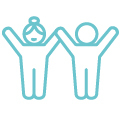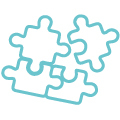Education
Strengthening access to quality education for all
In some Indian and Nepalese villages, community schools are underfunded, neglected and sometimes non-existent. Public schools, even in urban areas, remain inaccessible to children from economically disadvantaged families, creating educational inequalities.
Some figures : In India, 64% of adult women are illiterate, while in Nepal the rate is 71% (2018). Early school leaving is also a concern in both countries, affecting 50% of young people in secondary education.

Education is not only a means of improving living conditions, it is also an opportunity for an individual’s development. It is a key factor in promoting equality and autonomy. That is why at Karuna, one of our objectives is to offer everyone a chance to learn : children, young people and adults.
Our early childhood program brings joy, encourages cooperation and promotes the healthy development of children. In the primary schools, we encourage young people to become more generous and responsible. Basic education for illiterate adults is ongoing at all our sites.
Our impact in 2024

11,840 children and adolescents supported in their schooling

7,975 young children attended kindergarten

1,080 children practiced yoga

629 adult women taught to read and write
One of our programs in Nepal
Building, renovating and equipping elementary schools
Isolated rural villages lack infrastructure. We build and rehabilitate schools with the voluntary participation of local residents.
In the Ruby Valley, after almost two years of work and refurbishment, the Kharsa School is now up and running, with the supply of furniture, insulation work and the creation of a playground. In Sindhuli, local residents generously contributed to the construction of a new school. In our other locations, we have equipped several schools with drinking water supplies, which they had not had since the 2015 earthquakes.
When I heard that a new school was being constructed in our community, I felt immense joy. We must focus on the future – our children. They deserve quality education and a bright future. Every day during the construction, I gave my best. The work was hard, but the children’s smiles made all the effort worthwhile.
Gau Maan Magar, Volunteer mason and grandfather of a school pupil